
Alcoholism is the continued drinking of alcohol despite negative results. Problematic use of alcohol has been mentioned in the earliest historical records, such as in ancient Egypt and in the Bible, and remains widespread; the World Health Organization (WHO) estimated there were 283 million people with alcohol use disorders worldwide as of 2016. The term alcoholism was first coined in 1852, but alcoholism and alcoholic are stigmatizing and discourage seeking treatment, so clinical diagnostic terms such as alcohol use disorder or alcohol dependence are used instead.

John Griffith Chaney, better known as Jack London, was an American novelist, journalist and activist. A pioneer of commercial fiction and American magazines, he was one of the first American authors to become an international celebrity and earn a large fortune from writing. He was also an innovator in the genre that would later become known as science fiction.

"John Barleycorn" is an English and Scottish folk song listed as number 164 in the Roud Folk Song Index. John Barleycorn, the song's protagonist, is a personification of barley and of the alcoholic beverages made from it: beer and whisky. In the song, he suffers indignities, attacks, and death that correspond to the various stages of barley cultivation, such as reaping and malting.
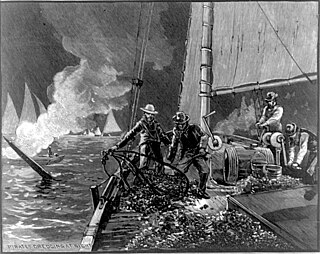
Oyster pirate is a name given to persons who engage in the poaching of oysters. It was a term that became popular on both the West Coast of the United States and the East Coast of the United States during the 19th century.
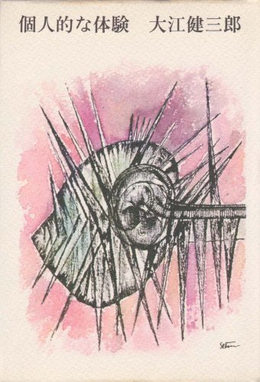
A Personal Matter is a 1964 semi-autobiographical novel by Japanese writer Kenzaburō Ōe. It tells the story of a young father who must come to terms with the fact that his newborn son is severely mentally disabled.
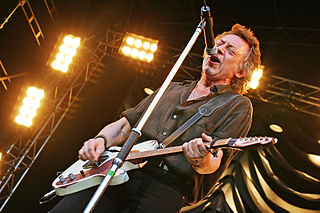
Ulf Gerhard Lundell is a Swedish writer, poet, songwriter, composer, musician and artist.

Desolation Angels is a semi-autobiographical novel written by Beat Generation author Jack Kerouac, which makes up part of his Duluoz Legend. It was published in 1965, but was written years earlier, around the time On the Road was in the process of publication. The events described in the novel take place from 1956-1957. Much of the psychological struggle which the novel's protagonist, Jack Duluoz, undergoes in the novel reflects Kerouac's own increasing disenchantment with the Buddhist philosophy. Throughout the novel, Kerouac discusses his disenchantment with fame, and complicated feelings towards the Beat Generation. He also discusses his relationship with his mother and his friends such as Allen Ginsberg, Neal Cassady, Lucienn Carr and William S. Burroughs. The novel is also notable for being a relatively positive portrayal of homosexuality and homosexual characters, despite its use of words that were at the time considered homophobic slurs.
State-dependent memory or state-dependent learning is the phenomenon where people remember more information if their physical or mental state is the same at time of encoding and time of recall. State-dependent memory is heavily researched in regards to its employment both in regards to synthetic states of consciousness as well as organic states of consciousness such as mood. While state-dependent memory may seem rather similar to context-dependent memory, context-dependent memory involves an individual's external environment and conditions while state-dependent memory applies to the individual's internal conditions.
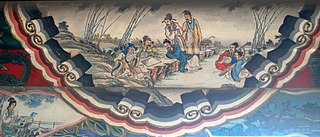
Liu Ling, born 221 and died 300 CE, was a Chinese poet and scholar. Little information survives about his family background, though he is described in historical sources as short and unattractive, with a dissipated appearance.

Delirium tremens (DTs),, is a rapid onset of confusion usually caused by withdrawal from alcohol. When it occurs, it is often three days into the withdrawal symptoms and lasts for two to three days. Physical effects may include shaking, shivering, irregular heart rate, and sweating. People may also hallucinate. Occasionally, a very high body temperature or seizures may result in death. Alcohol is one of the most dangerous drugs to withdraw from.
"Seeing pink elephants" is a euphemism for hallucinations caused by delirium tremens or alcoholic hallucinosis, especially the former. The term dates back to at least the early 20th century, emerging from earlier idioms about seeing snakes and other creatures. An alcoholic character in Jack London's 1913 novel John Barleycorn makes reference to the hallucination of "blue mice and pink elephants" while describing the two different types of men that consume alcohol excessively. Another notable instance of the appearance of pink elephants in popular culture is the "Pink Elephants on Parade" section of the 1941 Walt Disney animated film Dumbo.
Alcohol myopia is a cognitive-physiological theory on alcohol use disorder in which many of alcohol's social and stress-reducing effects, which may underlie its addictive capacity, are explained as a consequence of alcohol's narrowing of perceptual and cognitive functioning. The alcohol myopia model posits that rather than disinhibit, alcohol produces a myopia effect that causes users to pay more attention to salient environmental cues and less attention to less salient cues. Therefore, alcohol's myopic effects cause intoxicated people to respond almost exclusively to their immediate environment. This "nearsightedness" limits their ability to consider future consequences of their actions as well as regulate their reactive impulses.

Binge drinking, or heavy episodic drinking, is drinking alcoholic beverages with an intention of becoming intoxicated by heavy consumption of alcohol over a short period of time, but definitions vary considerably.
Gerald Hanley was an Irish novelist and travel writer and was born in Liverpool of Irish parents. Hanley's novels reflect his experiences of living in Africa, Burma and the Indian sub-continent, as well as his life as a soldier. His first book, Monsoon Victory was published in 1946, and his last novel, Noble Descents in 1982.
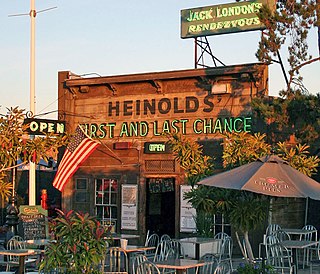
Heinold's First and Last Chance is a waterfront saloon opened by John (Johnny) M. Heinold in 1883 on Jack London Square in Oakland, California, United States. The name "First and Last Chance" refers to the time in which for many sailors, the pub was the first and last chance to drink alcohol heavily before or after a long voyage.

The Drinker is a novel by German writer Hans Fallada, first published posthumously in 1950.

The Cruise of the Dazzler is an early novel by Jack London, set in his home city of San Francisco. It is considered a boy's adventure novel.

Alcohol, sometimes referred to by the chemical name ethanol, is a depressant drug that is the active ingredient in fermented drinks such as beer, wine, and distilled spirits. It is one of the oldest and most commonly consumed recreational drugs, causing the characteristic effects of alcohol intoxication ("drunkenness"). Among other effects, alcohol produces happiness and euphoria, decreased anxiety, increased sociability, sedation, impairment of cognitive, memory, motor, and sensory function, and generalized depression of central nervous system (CNS) function.
Alcohol-related brain damage alters both the structure and function of the brain as a result of the direct neurotoxic effects of alcohol intoxication or acute alcohol withdrawal. Increased alcohol intake is associated with damage to brain regions including the frontal lobe, limbic system, and cerebellum, with widespread cerebral atrophy, or brain shrinkage caused by neuron degeneration. This damage can be seen on neuroimaging scans.
Alcohol is a liquid form substance which contains ethyl alcohol that can cause harm and even damage to a person's DNA. "Alcohol consumption is recognized worldwide as a leading risk factor for disease, disability, and death" and is rated as the most used substance by adolescences. Adolescence is a transitional stage of physical and psychological changes, usually a time in a person life in which they go through puberty. Combining these transitional stages and the intake of alcohol can leave a number of consequences for an adolescent.














